Events and Activities
Franz Waldenberger gives talk at Japan-Germany Forum
-480x223.png)
Upon invitation by the Asia-Eurasia Research Institute DIJ director Franz Waldenberger will give a talk in Japanese on “Japan’s past and present through the eyes of a German” at the Japan-Germany Forum on June 15. The talk will take place online (Zoom) from 14.00-15.00h JST. It will be moderated by Hayase Isamu, chairman of the Japan-Germany Forum. Registration and details here
The Future of Liberalism: international symposium with keynote by Thomas Piketty
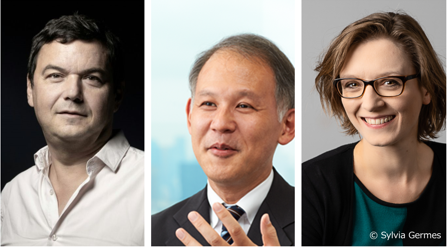 Thomas Piketty, French economist and author of Capital in the Twenty-first Century, will be the keynote speaker at the symposium ‘The Future of Liberalism: Japan, France and Germany in global context’. It will take place online from June 7 to 9 and features 18 international experts on liberalism and capitalism. On Day 1, Piketty’s keynote will be followed by a roundtable discussion with Lisa Herzog (University of Groningen) and Shigeki Uno (University of Tokyo). Day 2 features nine presentations, including by DIJ alumna Yufei Zhou on the “Transition of the Dominant Economic Ideology in China in the 21st Century”. On the closing day, DIJ director Franz Waldenberger will present his paper “Governance in a Knowledge Driven Society”. The symposium is jointly organised by the DIJ, the French Institute of Research on Japan at the Maison franco-japonaise (MFJ), and the Nippon Institute of Research Advancement (NIRA). Registration and details here
Thomas Piketty, French economist and author of Capital in the Twenty-first Century, will be the keynote speaker at the symposium ‘The Future of Liberalism: Japan, France and Germany in global context’. It will take place online from June 7 to 9 and features 18 international experts on liberalism and capitalism. On Day 1, Piketty’s keynote will be followed by a roundtable discussion with Lisa Herzog (University of Groningen) and Shigeki Uno (University of Tokyo). Day 2 features nine presentations, including by DIJ alumna Yufei Zhou on the “Transition of the Dominant Economic Ideology in China in the 21st Century”. On the closing day, DIJ director Franz Waldenberger will present his paper “Governance in a Knowledge Driven Society”. The symposium is jointly organised by the DIJ, the French Institute of Research on Japan at the Maison franco-japonaise (MFJ), and the Nippon Institute of Research Advancement (NIRA). Registration and details here
Environmental Humanities talk on ‘Cultural Specificity and Planetary Thinking’
 Ishimure Michiko is best known for her writing on mercury poisoning of the Shiranui Sea in and around Minamata in Southern Japan. Yet, in her later years she became increasingly invested in the concept of the planetary. In this talk, we will examine this shift in her writing and the complicated role that cultural forms play in writing that is especially invested in planetary health. Marran will introduce the concept of the “biotrope” as a tool for analyzing Ishimure’s attention to cultural and material elements in the discussion of Ishimure’s final work “Hana no okudo e” (2014). We will conclude our discussion by addressing the ways that area studies may or may not be compatible with particular forms of ecocriticism. This talk is part of the DIJ Environmental Humanities in East Asia lecture series and takes place online on May 25. Details and registration here
Ishimure Michiko is best known for her writing on mercury poisoning of the Shiranui Sea in and around Minamata in Southern Japan. Yet, in her later years she became increasingly invested in the concept of the planetary. In this talk, we will examine this shift in her writing and the complicated role that cultural forms play in writing that is especially invested in planetary health. Marran will introduce the concept of the “biotrope” as a tool for analyzing Ishimure’s attention to cultural and material elements in the discussion of Ishimure’s final work “Hana no okudo e” (2014). We will conclude our discussion by addressing the ways that area studies may or may not be compatible with particular forms of ecocriticism. This talk is part of the DIJ Environmental Humanities in East Asia lecture series and takes place online on May 25. Details and registration here
Speaker:
Christine L. Marran, University of Minnesota
DIJ Method Talk on Critical Discourse Analysis and the politics of reproduction
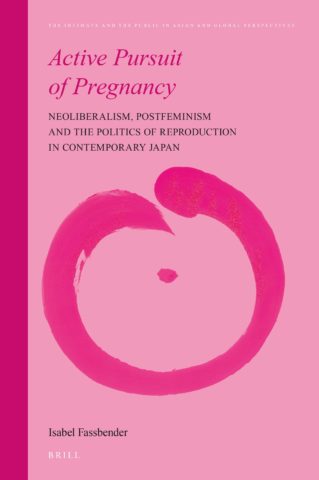
With ongoing attempts since the early 1990s to elevate the low birth rate in Japan, the politics of reproduction are a highly contested realm in Japanese society. While policy makers’ attempts to influence reproductive behavior on an individual level have been scrutinized in diverse analyses, the role of the biomedical business and mass media has been mostly overlooked. Isabel Fassbender addresses this lacuna in her recent publication Active Pursuit of Pregnancy: Neoliberalism, Postfeminism and the Politics of Reproduction in Contemporary Japan (Brill, 2021) by using Critical Discourse Analysis on the “active pursuit of pregnancy” (ninkatsu). In her talk, Isabel will not only focus on Critical Discourse Analysis as a research method in theory but also try to show a possible practical implementation by presenting concrete examples from her work. Details and registration here
Speaker:
Isabel Fassbender, Doshisha Women’s College, Kyoto
Online panel discussion of East and Southeast Asian responses to the Russian War on Ukraine
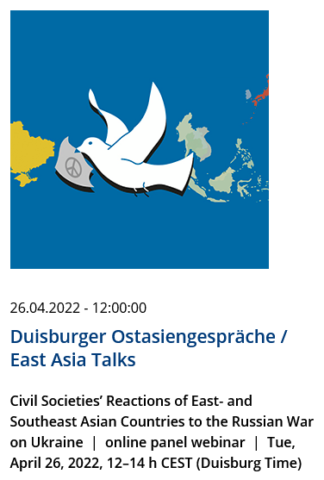
The Russian invasion of Ukraine and the US- and EU-led response to it are watershed events in global affairs with far-reaching political and economic implications for East and Southeast Asian stability. Governments in these regions have largely sided with the USA and the EU in the General Assembly of the United Nations; however, due to historically rooted and strategic reasons, most Southeast Asian governments did not join their efforts in sanctioning Russia. This online panel discussion will provide a critical assessment of the responses of countries across East and Southeast Asia. It features panelists Hee Kyoung Chang (Korea), Kasira Cheeppensook (ASEAN), Manuel R. Enverga III (Philippines), DIJ researcher David M. Malitz (Japan), Surachanee Sriyai (Thailand), Patrick Ziegenhain (Indonesia) as well as Claudia Derichs (moderation) and welcome remarks by DIJ director Franz Waldenberger and Nele Noesselt (director, IN-EAST). The panel is jointly organised by the Institute of East Asian Studies at the University of Duisburg-Essen (IN-EAST), the DIJ, the Chair of Transregional Southeast Asian Studies at Humboldt University Berlin, and the Faculty of Political Science, Chulalongkorn University, Bangkok. It takes place on Tuesday, April 26, 19-21h JST. Details and registration here
Joint DIJ-NUS Workshop explores Health Infrastructure in Asia
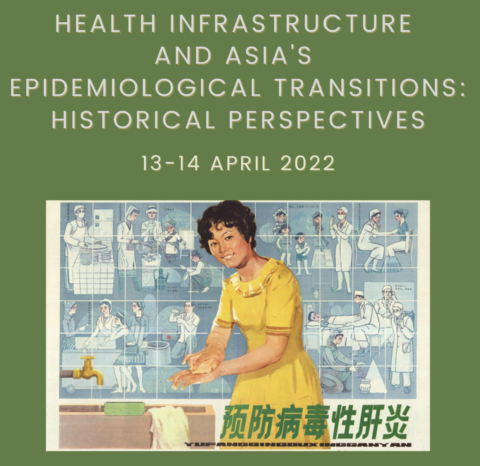
Jointly organised by the Asia Research Institute (National University of Singapore) and the DIJ, the workshop “Health Infrastructure and Asia’s Epidemiological Transitions: Historical Perspectives” will investigate Asian experiences in crafting health infrastructure over the long twentieth century. Asia has long been stigmatized as a source of global contagion, yet there has been relatively little historical examination of the everyday health challenges there, such as epidemiological transitions, climate change, and extensive internal and international migration. The workshop brings together scholars with different geographic foci within Asia to engage in a comparative and connective dialogue. It seeks to produce new ways of understanding the dynamics of health and disease under the processes of decolonization and development, but also with an eye to drawing lessons from the past that could lead to formulating better health policies in the present. The workshop takes place online on April 13-14 and is co-convened by DIJ’s David M. Malitz. Details and registration information here
Celia Spoden gives talk on cybernetic avatars and inclusive society at AI conference
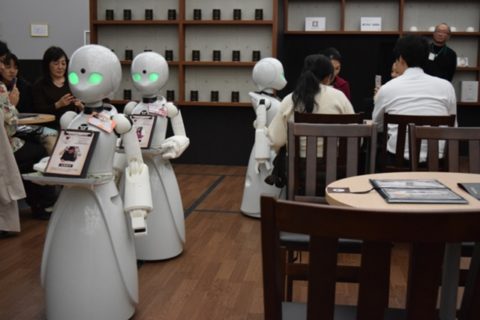
DIJ social scientist Celia Spoden will present her latest research on “Cybernetic avatars and the vision of an inclusive society” at the Japanese-German conference Artificial Intelligence and the Human: Cross-Cultural Perspectives on Science and Fiction (May 11-13). In her presentation, Celia focuses on the avatar technology OriHime which aims to counteract people’s loneliness and create new forms of social participation. Celia analyses how technologies such as the OriHime can make physical limitations less significant in cyber-physical spaces. In her paper she examines the cultural backgrounds as well as the social and ethical implications of this new technology. The conference takes place in Berlin and is jointly organised by the Alexander von Humboldt Institute for Internet and Society, the Japanese-German Center Berlin, and Waseda University.
Book exhibition ‘The City of Tokyo: Past and Present’ until 28 April
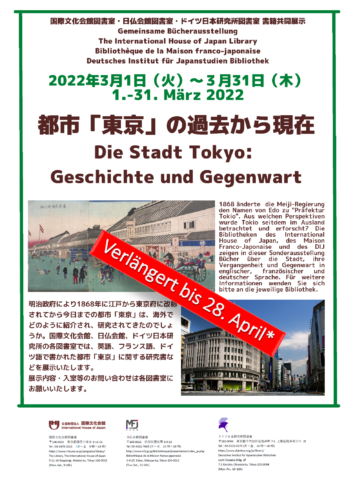
In 1868, the name of Edo was changed to “Tokyo Prefecture”. From which perspectives has Tokyo been viewed and researched abroad since then? In this special exhibition, the libraries of the International House of Japan, the Maison franco-japonaise and the DIJ are displaying books about the city, its past and present in English, French, and German. The joint book exhibition is open to the public from March 1 to March 31 (DIJ only: until April 28). For more information, please contact the respective library. Details and a list of books and articles at the DIJ library are available for download here.





 Open Access
Open Access
